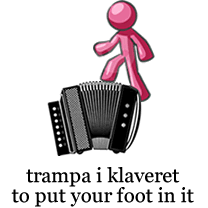When learning a new language, it helps if you learn how to use its grammar. There is much debate about how to do this.
Some people might advise you just to speak a language as soon as you know anything, and not to worry about making mistakes. In fact, they might encourage you to make mistakes. You will eventually pick up the grammar through extensive use of and exposure to the language, and maybe occasional glances at grammar books.
A ‘traditional’ approach to language learning involves concentrating more on learning the grammar before you try to use the language.
A combination of these approaches might be most effective. This is something I discussed on my latest podcast.
Last night one of the people at the French conversation group seems to have taken the first approach – he knows quite a bit of French vocabulary, but is not very good at putting words together into coherent sentences, or at using the grammar. As a result, it was rather difficult to work out what he was trying to say. I imagine native speakers of French might have less patience than us when trying to understand him.
So while it is possible to speak a language without knowing much of the grammar, you might find it difficult to make yourself understood.


